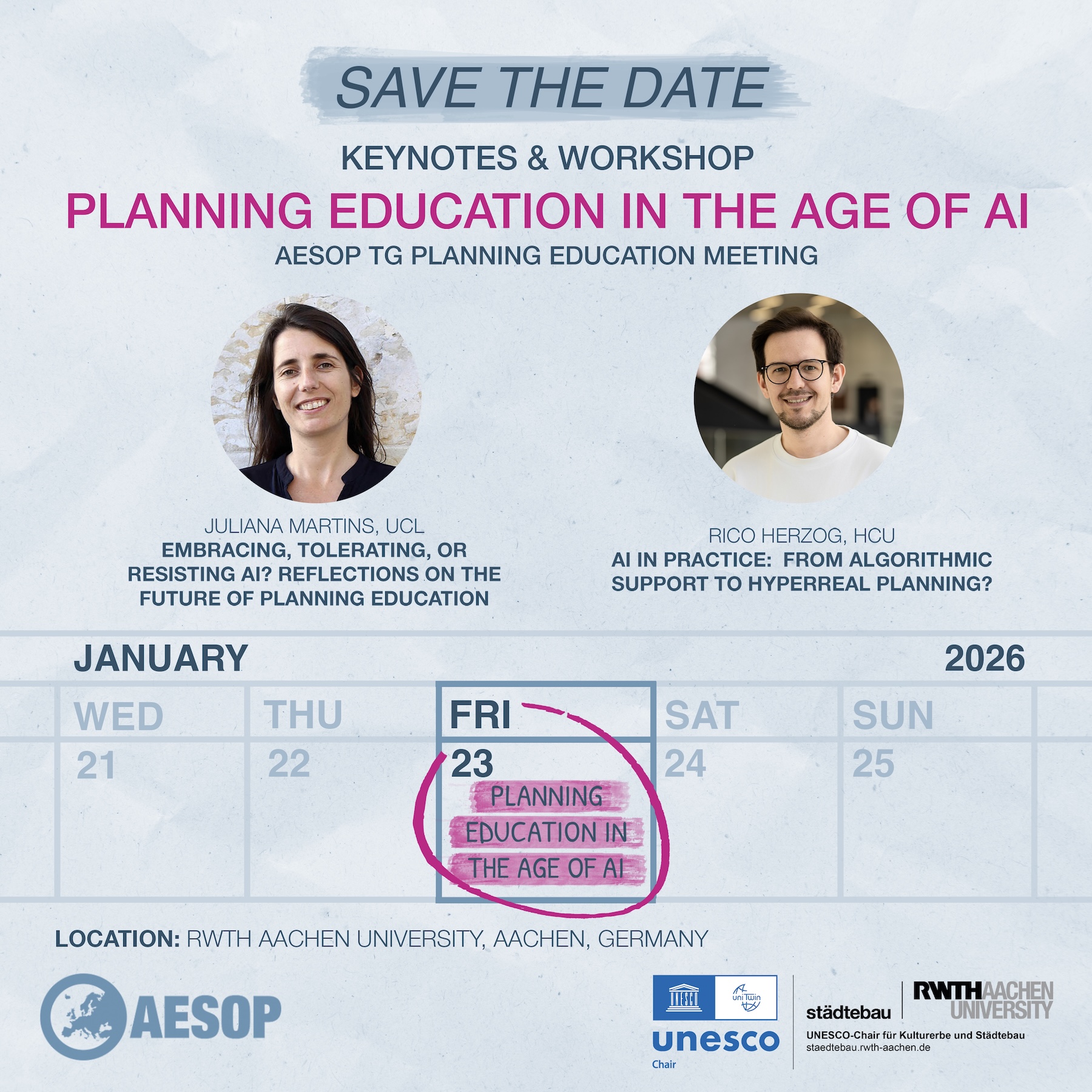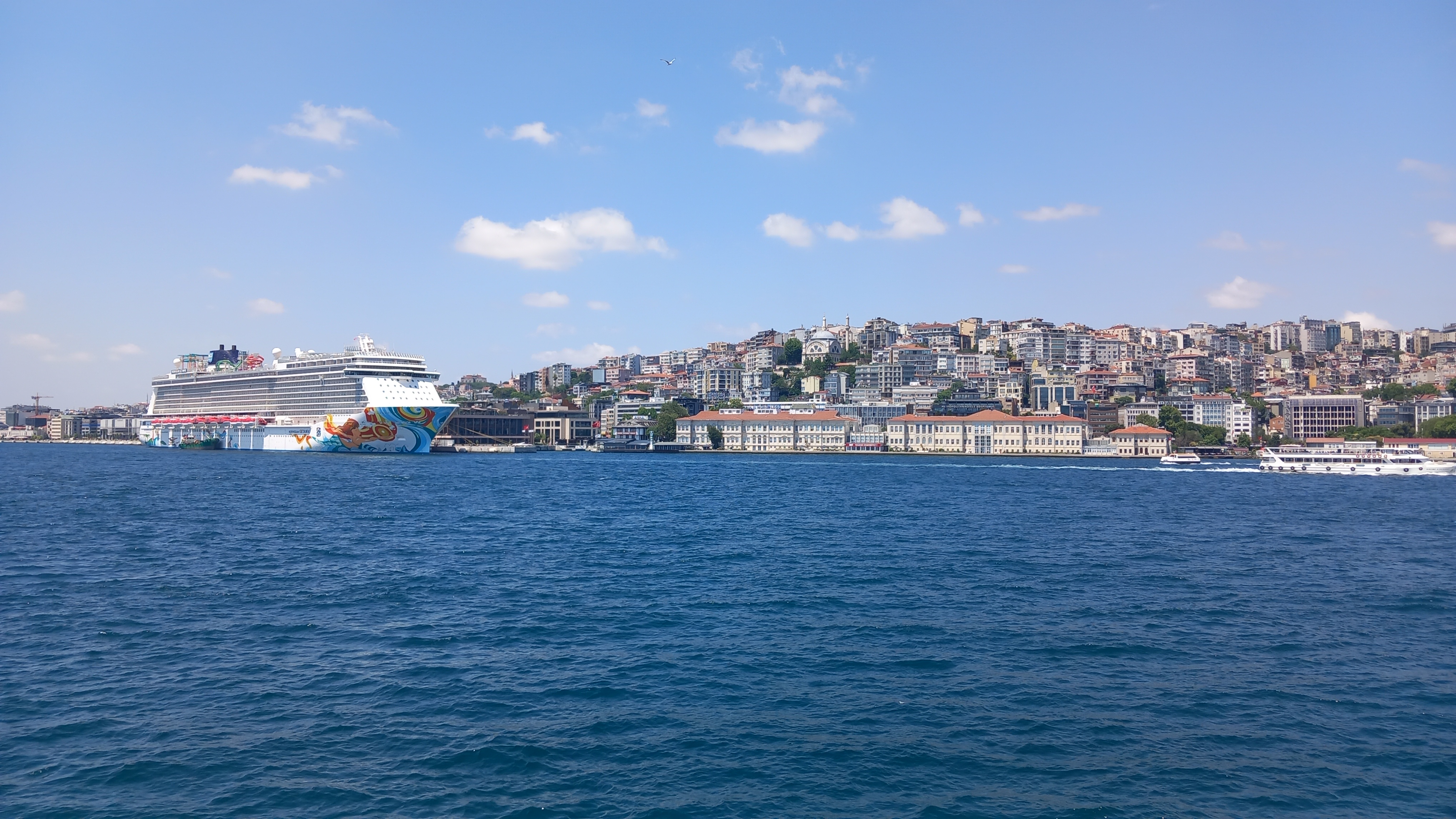THEMATIC GROUPS
- Details
- Parent Category: THEMATIC GROUPS
- Category: Planning Education
Artificial intelligence is transforming the way knowledge is produced, shared and applied, and is challenging long-held practices in higher education. For spatial planning in particular, this change is profound: AI is reshaping analytical reasoning, design thinking and ethical judgement, all of which are central to the discipline. The question is no longer whether AI has a place in the classroom, but rather how it is altering the ways in which planning knowledge is taught, learnt, and assessed. This international workshop will bring together universities and practitioners to explore these changes through keynote speeches and collaborative sessions. Themes will include: rethinking assessment when AI tools are part of the learning process, addressing ethics and bias through critical AI literacy, and reimagining curricula to foster new forms of teaching and reflection. The event aims to clarify how education can adapt to ensure that graduates use AI effectively and think critically alongside it, thereby helping to redefine the foundations of spatial planning education.
Workshop programme:
9:30am – 5pm (CET)
Speakers:
- Rico Herzog, City Science Lab, HafenCity University Hamburg
AI in practice: From algorithmic support to hyperreal planning?
- Juliana Martins, Bartlett School of Planning, University College London
Embracing, tolerating, or resisting AI? Reflections on the future of planning education
Parallel working sessions:
- Proving knowledge in the AI era
- Ethics and bias in AI for planning education
- Innovating curricula through thinking with AI
Registration by December 15:
https://docs.google.com/forms/d/e/1FAIpQLSeIEcS2Uv-ylUTCfOElIpOb7whDoIe3CyvsXZJ_V1ohSlYWKQ/viewform?usp=dialog
Contact: Fabio Bayro Kaiser (bayrokaiser@

- Details
- Parent Category: THEMATIC GROUPS
- Category: Public Spaces and Urban Cultures
Politics of Hope for the Enjoyment of the Sea
Napoli | 6-7 November 2025
Event of the AESOP Thematic Group ‘Public Spaces and Urban Cultures’
As a “collectively mobilized resource” hope holds together utopian aspiration and practical negotiation, seeking alternatives to technocratic control in shaping urban life. The Politics of Hope (Appadurai, 2007) points toward real processes of social transformation through what the Thematic Group Public Spaces and Urban Cultures describes as “collective endeavours influencing the material, imagined, and sensed dynamics that shape urban realities”. A deeper awareness of rights, a broader access to knowledge and a proactive involvement in decision making are some of the ingredients to allow people to practice their imaginations for urban future and realize their agency in the social-urban transformation (Schatzki et al., 2001). These elements also underpin the protagonism of the Neapolitan Committee Mare Libero Pulito e Gratuito [Free Sea] and the Neapolitan Urban Commons Network within the city’s multiple contested urban scenarios.
The event is jointly organized by the Institute for Research on Innovation and Services for Development (Cnr Iriss) and the AESOP Thematic Group Public Spaces and Urban Cultures, within the Erasmus+ project PS-U-GO Education in Living Labs: Participatory Skills for sustainable Urban Governance (www.psugo.eu/).

6 November 15:00
Maschio Angioino - Castel Nuovo, Event Room
V. Vittorio Emanuele III
Introduction
Stefania Ragozino | Cnr Iriss
Collectively Mapping the enjoyability of Neapolitan Coast*
Stefano Cuntò | University of Naples
PS-U-GO ULL Naples: a short documentary
Lorenzo Lodato | Lido Pola Urban Commons
KEYNOTE LECTURE
Why does water matter to the everyday cultures and practices of city dwellers?
Sophie Watson | Open University London
ROUNDTABLE
Co-Producing Hope through the Enjoyment of Waters
Gabriella Esposito De Vita | Cnr Iriss
Paolo Landri | Cnr Iriss
Lorenzo Lodato | Lido Pola Urban Commons
Valentina Rossi | Cnr Iriss
Maura Striano | Naples City Council
Anna Terracciano | University of Naples
Raffaele Vaccaro | Nisida Environment
Sophie Watson | Open University London, UK
Moderation Tihomir Viderman | BTU Cottbus-Senftenberg - AESOP TG PSUC
7 November 10:00-12:00
Mergellina Metro Station
Neapolitan Coast Mobile Workshop
Committee Mare Libero Napoli
- Details
- Parent Category: THEMATIC GROUPS
- Category: Urban Futures
For the Workshop: How do we say future? in Istanbul 2026 the Deadline for applications has been extended to 16 November 2025.
The Workshop will be a co-production of the AESOP TG Urban Futures and Mimar Sinan Fine Arts University, Istanbul. With "How do we say future?" we want to explore the ways we envision and narrate futures and how this is shaped not only by who is involved, but also by which types of tools and approaches we use, from which disciplines they originate, and for what purposes we use them? Scholars and practitioners with an interest in futuring and futuring approaches from diverse disciplines such as urban planning, architecture, visual arts, sociology, literature, communication, and technology are warmly invited to participate. The workshop will run from 2-4 February 2026 in Istanbul, Turkey, the Department of Urban and Regional Planning at Mimar Sinan Fine Arts University. The workshop will accommodate a maximum of 30 participants. To ensure diversity in groups and facilitate a fair selection process, candidates are expected to submit online a brief professional account, a short motivation (300 words) of why they plan to participate, and finally an extended abstract (1500 words, references not included). All materials can be submitted via this link. Participation is free of charge. Participants will have to cover their individual expenses for travel, accommodation and sustenance. Further information can be obtained from
- Details
- Parent Category: THEMATIC GROUPS
- Category: Ethics, Values and Planning
Group members, save the date!
📢 ROBOTS TAKING OVER THE CITY?! CHALLENGES FOR ETHICS AND SPACE, on October 24 at 10:00 CET.
This is the first online seminar of the colloquium series (fall season) by our AESOP - Association of European Schools of Planning Thematic Group: "Ethics, Values and Planning."
🤖 While most of us can probably conjure doomsday-esque images of a robot-driven takeover (think Blade Runner, Westworld, Minority Report, Avengers: Age of Ultron), what do scholars working on the spatial and ethical implications of today’s robots in urban spaces really think is occurring? How are robots changing our current human experience of space in the city and what are the possible benefits and drawbacks?
In this seminar, Casey Lynch and Shanti Sumartojo will discuss their research on these topics and more, followed by an open Q&A with audience members.
🗓️ Date: October 24th at 10:00 CET
👩💻 Format: online via Teams (1 and a half hour)
🔗 Register here to receive the Teams link: https://docs.google.com/forms/d/e/1FAIpQLSde6Cqg9Np12-1OTT7NWH2faeHDq6jnb-nJ5zNizriPTkdATQ/viewform
- Details
- Parent Category: THEMATIC GROUPS
- Category: Urban Futures
Further to our previous announcment, we are happy to open the Call for Participation!
Workshop location and format
From 2–4 February 2026 in Istanbul, Turkey, the Department of Urban and Regional Planning at Mimar Sinan Fine Arts University (in picture), in collaboration with the AESOP Thematic Group Urban Futures, will organise a three-day workshop to address these questions.
Participants will engage in various workshop formats, supported by local mentors and working in smaller groups, to develop and propose new and creative futuring approaches for a local case of sea-level rise in Istanbul’s old town. Participants will have the opportunity to contribute futuring approaches they are familiar with, or interested in, and to learn from others.
As an outcome of the workshop, the question “How do we say future?” will be examined in depth, and alternative methodologies, approaches, and toolkits for both global and local contexts will be explored.
Roundtable discussions will be organised for interdisciplinary debates, and new creative approaches will be encouraged through keynotes and mentor sessions to provide a unifying platform. The meeting, enriched by the sharing of experiences related to local expertise, will feature presentations on the practices of the Marmara Municipalities Union, of which Istanbul is also a member city (https://www.marmara.gov.tr/en).
How to participate?
The workshop focuses on generating ideas and achieving results in a short period of time. The workshop will accommodate a maximum of 30 participants. To ensure diversity in groups and facilitate a fair selection process, candidates are expected to submit online a brief professional account (Google Form), a short motivation (300 words) of why they plan to participate, and finally an extended abstract (1500 words, references not included).
The extended abstract shall combine a reflection on ‘futuring’ with actual research interests, chosen theories or concepts, methodological approaches. In our own reflections on a planners’ role, futuring will be less of an issue of ‘control the future’ but rather instead to ‘midwife the future’ (Ganis 2015). Instead of knowing the exact outcomes in advance to implement a future according to ‘plan’, we might rather be looking into trajectories and possibilities. Instead of owning the future as experts with capacity to control, for instance legally, the role changes towards stewardship and place “becomes a ‘participant’ in the ‘flow of action’ and entrusts the design professional to deliver a relevant place. As such, control of the future implies that there is a fixed expectation for a place and midwifery of the future implies that there is no fixed expectation for a place; rather, the place becomes what it needs to be.” (Ganis 2015, p. 4) Early career scholars and practitioners are highly encouraged to apply, as participants are not expected to be seasoned experts regarding the futuring topics they have an interest in. The organizers plan to document the workshop results in an edited publication (with ISBN), combining group work products, expert reflections, and the individual extended abstracts coming from participants (in revised form).
The submission form and the up-load of the extended abstract can be reached through this link (copy & paste!) https://docs.google.com/forms/d/e/1FAIpQLScfnq-G2V1erITAD1mrh4mxqDxU36ptDjxNDC8sucNvSXJGmg/viewform?usp=dialog
Timeline
- Submission of application form deadline: 29 October 2025
- Notification of acceptance: early December (accepted contributors will receive further information about registration and others shortly after the notification of acceptance)
- Workshop: 2-4 February 2026
Participation is free of charge - participants have to cover travel and accommodation costs.
Organisation and Contact
The event is organised by Melih Birik and Bahar Aksel from the Department of Urban and Regional Planning at Mimar Sinan Fine Arts University Istanbul, Turkey (local organising team) and Manuel Caldeira (Leipzig Graduate School of Management) Germany together with the coordinators of the AESOP thematic group on Urban Futures, Peter Ache (Prof em. Radboud University, Netherlands) and Thomas Machiels (University of Antwerp, Belgium).
E-mail contact:
The full call can be found here.
- Safe the day: How do we say future? Workshop Istanbul 2-4 February 2026
- Pre-Conference Seminar 'Adaptive governance: systems perspectives' (01 Oct 2025)
- Hybrid lecture series: Ukraine’s European Path: Historical Legacy, Regional Development, and Future Integration
- Autumn/winter 2025 Lecture Series on Small Towns


